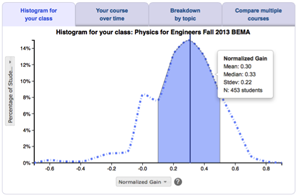
Developed by: David Hestenes and Malcolm Wells








middle schoolhigh schoolintro collegeinter-mediateupper levelgrad school other

calc based

alg based

conceptual








Overview
What? Instruction organized around active student construction of conceptual and mathematical models in an interactive learning community. Students engage with simple scenarios to build, test and apply the handful of scientific models that represent the content core of physics.
Why? It engages students in building, testing, deploying, and revising models, which is the heart of the scientific process. It has been shown to improve conceptual understanding and problem-solving skills.
Why not? Effectively implementing Modeling Instruction requires participation in a 3-week professional development course and accessing instructional materials requires a paid membership to the American Modeling Teachers Association. There is an associated cost for both teachers and individual students.
Classroom video
Student skills developed
- Conceptual understanding
- Problem-solving skills
- Using multiple representations
- Designing experiments
- Metacognition
- Lab skills
- Making real-world connections
Instructor effort required
- High
Resources required
- Computers for students
- Advanced lab equipment
- Tables for group work
Resources
- Modeling workshops: The American Modeling Teachers Association offers 3-week in-person workshops all over the country every summer. Find one near you.
- Blog post from Frank Noschese with lots of resources
- Modeling Instruction in the Science Classroom (podcast) Mark Schober, president of the American Modeling Teacher’s Association, shares a history of modeling, how it can be used in the classroom, and that it is for more than just physics courses. From NSTA’s Lab Out Loud podcast.
- PhysPort's page on University Modeling Instruction describes the same method designed for use in college or university classrooms. There are many free resources for University Modeling Instruction.
Videos:
More videos of teachers using Modeling Instruction
Research
This is the second highest level of research validation, corresponding to:
- at least 1 of the "based on" categories
- at least 2 of the "demonstrated to improve" categories
- at least 4 of the "studied using" categories
Research Validation Summary
Based on Research Into:
- theories of how students learn
- student ideas about specific topics
Demonstrated to Improve:
- conceptual understanding
- problem-solving skills
- lab skills
- beliefs and attitudes
- attendance
- retention of students
- success of underrepresented groups
- performance in subsequent classes
Studied using:
- cycle of research and redevelopment
- student interviews
- classroom observations
- analysis of written work
- research at multiple institutions
- research by multiple groups
- peer-reviewed publication
References
- G. Fulmer and L. Liang, Measuring Model-Based High School Science Instruction: Development and Application of a Student Survey, J. Sci. Educ. Tech. 22 (1), 37 (2013).
- I. Halloun, Modeling Theory in Science Education (2004), Vol. 24.
- I. Halloun, Mediated Modeling in Science Education, Sci. & Educ. 16 (7-8), 653 (2006).
- I. Halloun and D. Hestenes, Modeling instruction in mechanics, Am. J. Phys. 55 (5), 455 (1987).
- D. Hestenes, Toward a modeling theory of physics instruction, Am. J. Phys. 55 (5), 440 (1987).
- D. Hestenes, Modeling Games in the Newtonian World, Am. J. Phys. 60 (8), 732 (1992).
- D. Hestenes, Modeling methodology for physics teachers, presented at the The changing role of physics departments in modern universities: International Conference on Undergraduate Physics, College Park, MD, 1996.
- D. Hestenes, Modeling Theory for Math and Science Education, in Modeling Students' Mathematical Modeling Competencies (2009).
- D. Hestenes, C. Megowan-Romanowicz, S. Osborn Popp, J. Jackson, and R. Culbertson, A graduate program for high school physics and physical science teachers, Am. J. Phys. 79 (9), 971 (2011).
- L. Liang, G. Fulmer, D. Majerich, R. Clevenstine, and R. Howanski, The Effects of a Model-Based Physics Curriculum Program with a Physics First Approach: a Causal-Comparative Study, J. Sci. Educ. Tech. 21 (1), 114 (2011).
- K. Malone, A Comparative Study of the Cognitive and Metacognitive Differences between Modeling and Non-Modeling High School Physics Students, PhD, Carnegie Mellon University, 2006.
- K. Malone, The convergence of knowledge organization, problem-solving behavior, and metacognition research with the Modeling Method of physics instruction – Part I, Journal of Physics Teacher Education Online, Report No. 4 - 1, 2006.
- K. Malone, The convergence of knowledge organization, problem-solving behavior, and metacognition research with the Modeling Method of physics instruction – Part II, Journal of Physics Teacher Education Online, Report No. 4 - 2, 2007.
- K. Malone, Correlations among knowledge structures, force concept inventory, and problem-solving behaviors, Phys. Rev. ST Phys. Educ. Res. 4 (2), 020107 (2008).
- C. Megowan-Romanowicz, Framing Discourse for Optimal Learning in Science and Mathematics, Arizona State University, 2007.
- C. Megowan-Romanowicz, Inside Out: Action Research from the Teacher–Researcher Perspective, J. Sci. Teach. Educ. 21 (8), 993 (2010).
- C. Megowan-Romanowicz, Modeling Discourse in Secondary Science and Mathematics Classrooms, in Modeling Students' Mathematical Modeling Competencies (2013).
- M. O'Brien and J. Thompson, Effectiveness of Ninth-Grade Physics in Maine: Conceptual Understanding, Phys. Teach. 47 (4), 234 (2009).
- A. Stammen, K. Malone, and K. Irving, Effects of Modeling Instruction Professional Development on Biology Teachers’ Scientific Reasoning Skills, Educ. Sci. 8 (3), 119 (2018).
- M. Wells, Modeling Instruction in High School Physics, http://modeling.asu.edu/thesis/WellsMalcolm_dissertation.doc, Arizona State University, 1987.
- M. Wells, D. Hestenes, and G. Swackhamer, A modeling method for high school physics instruction, Am. J. Phys. 63 (7), 606 (1995).
- C. Wenning, Whiteboarding & Socratic dialogues: Questions & answers, J. Phys. Teach. Online 3 (1), (2005).






